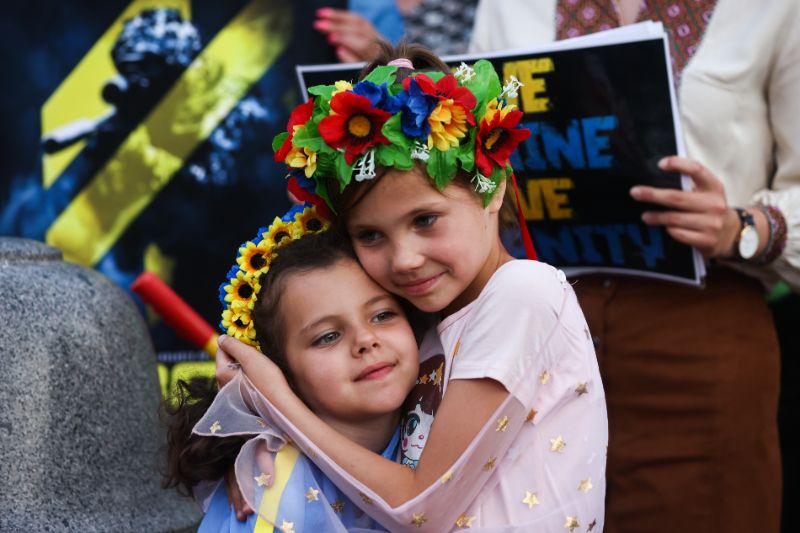
Foto: ZUMAPRESS/Scanpix/LETA
Sigita Struberga, “Latvijas Avīze”, JSC “Latvijas Mediji”
–
Russian propaganda reports that the Belarusian invasion of Ukraine will take place tomorrow. NBS captain on the situation in Belarus
–
VIDEO. Bordans snatches the microphone from Shleser’s hands in “Lamp”! How the discussion of politicians turns into a circus
–
TV personality Roberto Meloni has returned to Latvia after experiencing serious troubles in Spain
Four months have passed since Russia launched the largest military offensive in Europe after World War II in Ukraine.
The West has implemented retaliatory measures to signal to the Kremlin about the unacceptability of its actions and limit its financial capabilities. For the first time, the EU sends weapons to a warring third country, NATO members supply ammunition.
However, this has not been enough and has sparked debates about how united the West is and how much of its comfort it is willing to sacrifice in the name of supporting Ukraine.
Europe also faces security challenges within its territory. However, although the war has forced us to change our thinking about security, there are still many traps of thinking that hinder an objective assessment of the situation and effective deterrence of Russian aggression.
From the perspective of the Baltic States and Poland, Western unity and the ability to stand up to Russia are critical aspects of deterrence. Not everyone in Europe agrees. First, some believe that Russia in Ukraine demonstrates its inability to pose a significant threat to NATO.
Such a focus on Russia’s tactical and operational problems creates a challenge for objective risk assessment.
The Kremlin’s ambitions and strategic decision-making patterns are ignored.
The Kremlin’s view of individual life and its readiness to pay the price of human and other resources for the smallest tactical success, which the Western countries would never include in their calculations, is forgotten.
Another thinking trap is related to a simplistic view of the causes of war and the possibilities of stopping it. Many Western political leaders have emphasized that this is not a war of Russian society, but of Putin personally. Someone else referred to the alleged change in Putin’s attitude and behavior. It overlooks Russia’s modern-day aggression, ignoring broad public support for the president. Russian society gave birth to this leader, it is characterized by imperialist sentiments and a traumatized perception of the collapse of the USSR.
Attempts to use the arguments of economic advantage and traditional political ties with Russia can be seen in the negotiations on the end of the war.
However, it is wrong to compare what is happening in the Kremlin with political processes in the West. Its rationality and calculations are not comparable to the understanding of rationality of Western politicians. There is no reason to rely on the Kremlin’s promises, obedience to international law or economic benefit as an argument.
Some Europeans believe that not Russia, but Ukraine and the West are to blame for hostilities. A May study by the European Foreign Policy Council shows that about 20% of the population of Germany, France and Italy believe that Ukraine, the EU or the US are guilty of starting the war. When assessing government support for Ukraine, about half of Poles, Italians, French and Germans believe their governments are paying too much attention to the war. Looking at public opinion in Latvia, there is no reason for optimism here either. The decline in support puts pressure on politicians who think primarily in terms of economic viability and electoral cyclicality.
Changing NATO’s strategic vision and agenda are currently the cornerstones of security in Europe. It is primarily a question of how the threat posed by Russia is defined. Only by clearly defining Russia as an enemy that poses a threat, it is possible to promote the appropriate assessment of risks and the development of strategies for their prevention.
It should include an increase in funding for security, the construction of new military infrastructure and the relocation of forces on NATO’s eastern border. A change of thinking regarding security policy – civil and military relations – is also important. It is unacceptable that the citizens of European countries see NATO as a guarantor of security, while at the same time questioning the intentions of its member states in NATO’s neighboring regions.
It is unacceptable that security issues are used in political bargaining processes, as is currently the case with Turkey’s demands for Finland and Sweden to join the alliance. Trading and calculations about keeping security issues on the political agenda is a current topic at the national level of European countries, including Latvia.
Only a strong demand of European citizens for security strengthening and continuous support for Ukraine will force politicians to continue what they started.
Every citizen of a NATO member must see his place, role and responsibility in building national and regional security. Responsible behavior means thoughtful voting in elections, critical thinking, evaluating the content offered by various information sources, and following democratic values.
It also includes the willingness to give up certain amenities and pay more for certain goods. We have no moral right to stop support, considering that Ukraine is also fighting for our security. Moreover, NATO’s credibility cannot be maintained without strengthening its capabilities and resilience against an aggressor.
–


